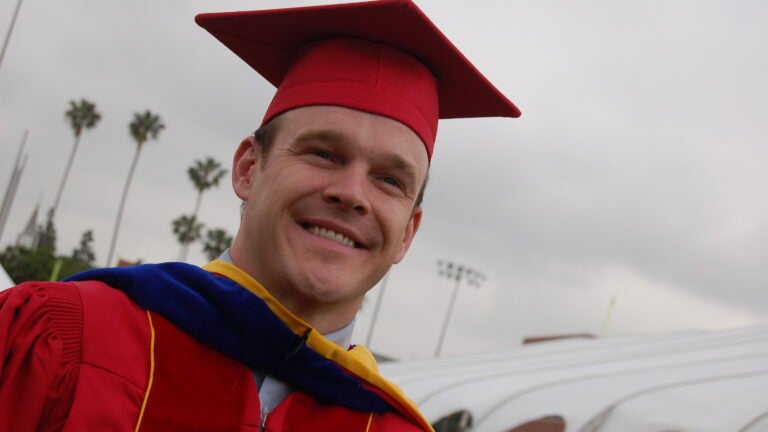
Scientist and Filmmaker
In high school, Howard Wayne Harris had a rough time in academics.
Because he had a difficult time spelling and handwriting one teacher advised him not to go to college.
How would that 9th grade teacher feel today to learn that Harris has not only earned his Ph.D., but has made breakthrough discoveries while working in a microbiology laboratory in USC Dornsife?
“I was such a slow test taker,” Harris recalled. “Handwritten essay tests were the worst.”
Then he was diagnosed with dysgraphia — a learning disability affecting handwriting and spelling. He also had problems focusing and was diagnosed with attention deficit disorder (ADD).
“It’s a really awkward moment, when everyone is finished with their test and you’re still sitting there,” Harris said. “You start wondering, ‘do I really belong in the classroom?’ ”
The answer was yes. All that Harris needed was a little extra time on tests. When that happened, he began to excel. It helped too, when he received photocopied notes from classmates.
He was the sole student in his school’s learning disability program who was taking advanced placement calculus and physics. Often times his teachers were confused. “What is a student with disabilities doing taking AP courses?” they asked.
On his spare time, he began making films and was good at it. He met a student in the USC School of Cinematic Arts, who encouraged him to go to film school. Harris got pumped up about that idea and entered USC as a film major.
Growing up in Santa Clarita, Calif., he took a summer internship at the Jet Propulsion Laboratory (JPL) in Pasadena for the purpose of making a documentary about scientists exploring life on Mars.
The more he watched and interviewed scientists, the more he became intrigued with science.
“You can see it in their eyes,” Harris said. “They love what they do and can’t wait to get to work in the morning.”
Howard Wayne Harris (right) worked in Ken Nealson’s laboratory as an undergraduate and was then invited to apply to graduate school. Photo by grad images.
By the end of the summer he began to work in the laboratory of Kenneth Nealson — then a professor at California Institute of Technology/JPL — and became hooked on research.
Harris looked carefully for the right college. Although he was accepted to several top colleges, he felt that USC was the place where he could do both science and filmmaking.
After researching, he learned that USC was also among the nation’s best universities for students with disabilities. Receiving accommodations he needed — small but significant things like a little extra time on tests — Harris excelled. A visual learner, Harris majored in biophysics and cinema.
At the time he added the biophysics major, Nealson took a position as the USC Wrigley Chair in Environmental Studies, and professor of earth sciences and biological sciences. Harris eventually worked in Nealson’s laboratory as an undergraduate and was then invited to apply to graduate school. After earning his bachelor’s degrees in cinema and biophysics, he was honored to learn he was accepted to the Ph.D. program in biological science.
“It’s very rare to find anyone else with a disability in a Ph.D. program,” he noted.
At USC Dornsife, Harris discovered and characterized a new bacterial sensing mechanism. He was the lead author on several scientific papers including an article published in the Proceedings of the National Academy of Sciences and the Biochemical Journal. All of his research papers are accompanied by online videos, which help readers visualize the experiment results.
“Film provides a way to communicate your findings to the public; even scientists want to see your work visually,” he said.
At his Ph.D. hooding ceremony May 16, Nealson, his adviser, was at his side. In January, Harris’ strongest advocate, his father, Norman Harris, a scientist himself, died suddenly after a stroke.

As a Ph.D. student, Howard Wayne Harris (far right) tutored high school students at the USC Wrigley Institute for Environmental Studies on Catalina Island. Photo courtesy of Harris.
“My dad wanted to see me receive my Ph.D.; it was a really big deal for him,” Harris said. “I definitely have been influenced by him and that will be very lasting in my life.”
His father and his mentors showed him that science is an opportunity for creativity and a way to make a positive mark in the world. Struggling through school made Harris aware of other students’ challenges, especially those who feel they don’t fit into the academic setting.
“I want to give these students a chance to do research projects in a lab,” he said.
While pursuing his Ph.D., Harris mentored high school students in his laboratory and helped them to develop their own research projects.
This summer, Harris is headed to France, where he will conduct research for a company searching for a new method to enhance oil recovery using microbes. He has also been offered a post doctorate position in a laboratory at the Massachusetts Institute of Technology.
“Science is an opportunity to discover something new that might help everyone,” he said. “It’s a chance to make a difference.”
Read about more of our outstanding 2013 USC Dornsife graduates